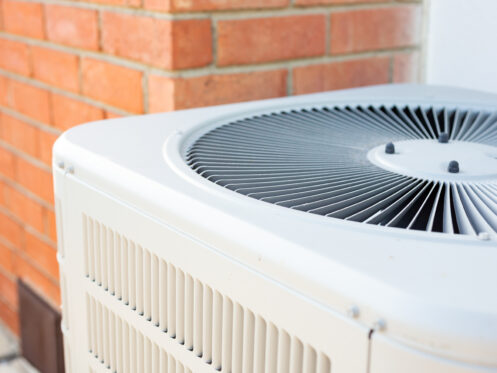Many trade organizations throughout the HVAC industry recommend annual HVAC maintenance. That includes one appointment for your cooling system in the spring and another for your heating system in the fall. That’s true even if your heating and cooling come from a singular unit, such as a heat pump. Trade organizations aren’t the only groups who recommend it. The U.S. Department of Energy does as well, so let’s explore why seasonal maintenance is essential.
Home Comfort
When an HVAC system is functioning optimally, you should experience a consistent temperature throughout the entire home or zone. Suboptimal performance can manifest in different ways. You may experience uneven heating or cooling in particular rooms. You may also have an entire room that feels too cold in winter or too hot in summer while the rest of the home feels fine. There are a number of causes for this, and you can avoid all of them with routine maintenance. Often, it’s low pressure caused by a clogged HVAC filter or grime buildup on a heating element or condenser or evaporator coil.
Energy Costs
Dirt accumulation is a serious issue when it comes to energy performance as well. Consider an air conditioner or heat pump with a dirty evaporator coil. That can easily increase your electricity costs by 15% or more, which is a dramatic difference. Your system can also experience inefficiencies due to worn lubrication and loosened screws and electrical connections. Many of these issues affect fuel-burning appliances as well. You can spend a lot more even on natural gas, heating oil and propane. In fact, seasonal tune-ups can often pay for themselves due to how much you’ll save annually.
HVAC Warranty
Many homeowners are unaware that their HVAC warranties stipulate annual maintenance for the covered equipment. If you ever need to make a warranty claim, the manufacturer can request proof of maintenance. If you can’t provide it, they have the right to refuse your claim. They may not always do that, but it’s certainly a risk. When we complete a tune-up, we provide the customer with documentation for their records. In the unfortunate event they have to file a claim down the line, they’ll have everything they need.
Home Safety
The big concern when it comes to HVAC safety is carbon monoxide. Gas furnaces and other fuel-burning equipment create carbon monoxide and other noxious gases as a byproduct of combustion. When everything is working well, the system exhausts those gases outside the home. During a service appointment, your technician will inspect the exhaust and rule out any leakage or backdrafting. The technician will also clean all the combustion-related components and test your CO monitors.
Carbon Footprint
Another reason HVAC maintenance is so important is your household’s carbon footprint. Over the last couple of decades, the HVAC industry has made impressive strides in reducing the carbon footprint of its equipment. However, it’s still a big problem. The impact of air conditioners is particularly notable. Global AC usage now accounts for twice as much greenhouse gases as the global aviation industry. Some scientists also predict that we’re decades away from HVAC being the top overall contributor. You can make a difference on an individual level and also ensure that your system creates less local pollution.
Indoor Air Quality
Indoor air quality (IAQ) is an important consideration as well. The EPA warns that indoor air pollution is among the top health risks for Americans. The good news is that most HVAC equipment does not cause IAQ issues directly, but it can exacerbate issues. Dust builds up on HVAC equipment and in ducts over time. The system recirculates those particulates through the home. That is particularly bad for people with asthma and serious allergies but can get bad enough to affect otherwise healthy people. Dust accumulation has a negative impact in another way. It absorbs other pollutants, extends their lifespans and continues to reemit them over time. That process can elevate pollution levels in the home.
Optimal Humidity
An air conditioner dehumidifies as a byproduct of cooling the air. It isn’t a dehumidifier. That said, for many homes, it provides enough dehumidification to keep the home at a comfortable level. There are a number of maintenance issues that can cause that not to be the case. A prime culprit is a dirty evaporator coil. It can also be due to a clogged HVAC filter or condensate drain line. An even more serious problem is low refrigerant pressure. This is likely due to a slow refrigerant leak.
Equipment Lifespan
Wear and tear has a cumulative effect. If you schedule seasonal maintenance, you minimize the long-term impact on your system. If you don’t, the lifespan of the equipment will shorten over time. This is often the difference in an HVAC unit that dies by the 12th year and once that is still running when you replace it. Many HVAC manufacturers provide lifespan expectations for their equipment, and when they do, they usually have the disclaimer “with annual maintenance.”
Fewer Repairs
Another way that you save with seasonal maintenance is lower repair costs. Studies show that serviced HVAC equipment is much less prone to unexpected failures. Maintenance extends the life of major components, such as fans, blowers, compressors and so forth. If you take a break-fix approach, those components become ticking time bombs. When they go, the repair costs are significant, and in some cases, the damage is so severe that you’ll need to replace the unit.
Preventative Repairs
Seasonal maintenance is also an opportunity for preventative repairs. If your technician notices a failing part, they’ll recommend that you should go ahead and replace it now. No homeowner wants to hear that, but it is a long-term positive. The repair you make today will be a lot cheaper. Doing it now also gives you control over the situation. Waiting for it to fail is going to be inconvenient. It can be a particularly big headache if you’re dealing with it during very hot or cold temperatures.
Technician Familiarity
It also helps if you find an HVAC company you trust and schedule them each year. You’ll build a relationship with that company. That company will also get to know your system. That familiarity does matter when making recommendations about repairs, upgrades, replacements and so on. Many companies also have a maintenance plan through which you can save not only on maintenance but repairs and installations.
HVAC Maintenance in Modesto
Loves Air offers seasonal HVAC maintenance throughout Modesto and the surrounding communities. As your local HVAC provider, we also perform new installs, replacements, conversions and repairs. We offer those services for gas and electric furnaces, heat pumps, air conditioners, ductless mini-splits and whole-house ventilation systems. You can count on us to install and program a new programmable or Wi-Fi thermostat. Our team installs, maintains and repairs tank and tankless water heaters. Our company also specializes in home energy audits, replacement windows and solar panel installation. If you have questions or would like to schedule an appointment, call Loves Air today or contact us online through our website.



